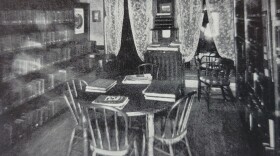In the heart of Wisconsin’s Northwoods, Lelah Starks tilled out a legacy that would shape the potato industry for generations. A woman ahead of her time, Starks became one of the most respected seed potato growers in the country, blending science with practical farming expertise. Her contributions not only elevated Wisconsin’s reputation as a leader in potato production but also influenced growers around the world.
Born on March 30, 1882, in Plainfield, Wisconsin, Lelah Starks grew up surrounded by fields, but her early interests were far from farming. She was the only child of Leonard and Emma Starks, and her father was also a pioneering figure in the potato industry. Leonard Starks had come to the Midwest in a covered wagon, eventually settling in Plainfield, near Stevens Point, before moving his family to Oneida County in 1911 and purchasing one thousand acres of formerly tree covered land from the Menasha Wooden Wares Company. The small settlement of Hobson, just east of Rhinelander, was later renamed Starks in his honor, became the center of the family’s farming operations.
Leonard Starks built a potato empire out of the once pine forested Northwoods, and became known as King Potato. The large stone Starks potato warehouse, along the old railroad line in his towns namesake still stands. By the time of his death in 1927, he had made and lost over a million dollars in the industry, leaving behind a large section of partly cleared land. Lelah, who had received a musical education and traveled to Europe three times as a young woman, found herself running the family farm. Initially more interested in raising chickens than potatoes, she quickly realized the potential of Wisconsin’s seed potato industry and turned an eye toward using science to develop her family potato farm.
Lelah Starks became, not just a farmer, she was an innovator. At a time when scientific research in agriculture was still gaining traction, she applied cutting edge techniques to improve seed potatoes. She became particularly known for her work with the Chippewa potato, a variety that would become highly sought after for its quality and disease resistance.
Growers from across North and South America traveled to the Northwoods to study her methods, seeking advice on how to improve their own production. Starks’ attention to detail, her willingness to incorporate scientific advancements, and her hands-on approach set her apart as one of the most respected figures in the field.
Her contributions did not go unnoticed. The University of Wisconsin honored her multiple times for her work in agriculture. In 1941, she was recognized as one of the state’s most outstanding rural leaders at the annual Farm and Home Week in Madison.
Beyond her own farming operations, Starks made financial grants to the university to support research on disease and insect control, further contributing agricultural progress.
Despite her impact on the industry, Lelah Starks remained a private and modest figure. She rarely sought public recognition and did not engage heavily in social or civic affairs outside of her farming community. She was for her lifetime, loyal to the Starks area and was dedicated to ensuring that the local farming industry thrived.
Lelah Starks’ work helped establish Wisconsin as a leader in seed potato production, and her influence is still felt today in the techniques and practices used by modern growers. While her name may not be as widely known as other agricultural pioneers, her contributions to the science and business of potato farming made a lasting mark. Lelah passed away on October 19th, 1951 at 68, ending a career of scientific contributions and potato growing.
In 1941, a seed potato research farm was developed near the old Starks property East of Rhinelander off of Hwy C with funds gifted to the University of Wisconsin by Lelah, who had worked closely with the UW Ag department. It was later expanded and moved to a site opposite Rhinelander West of town on Hwy K in 1979. In 1984, the facility was named in Lelah’s honor. Today the Lelah Starks Elite Foundation Seed Potato Farm is a 1000 acre potato research facility operated by the University of Wisconsin. The former site still maintains an ag research farm. Potato giant Lays, also operates a research farm near the old Starks property, all of which carry on the legacy that Lelah and the Starks family began over 100 years ago.
In an era when women in agriculture were often overlooked, Lelah Starks proved that expertise, innovation, and dedication could earn respect on any field, whether it be a potato field or on the global stage of agricultural science.
This episode is dedicated in honor of Women’s History Month, to all the women in Northwood’s history past, and present.
Sources: Rhinelander Daily News October 1951, UW Ag Department Website, History of Lincoln, Oneida and Vilas Counties 1924, Interview with Starks Potato Research Farm 2025.








